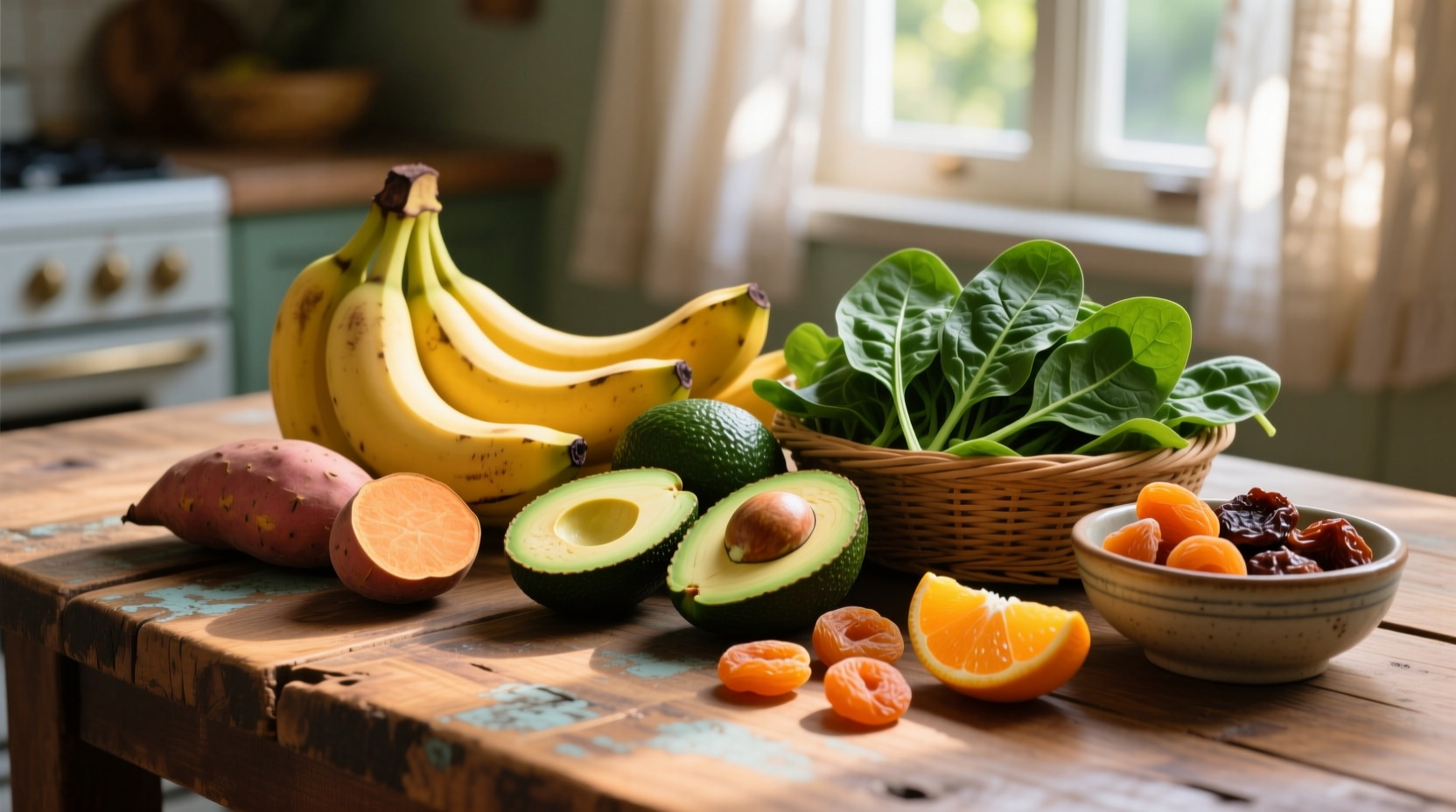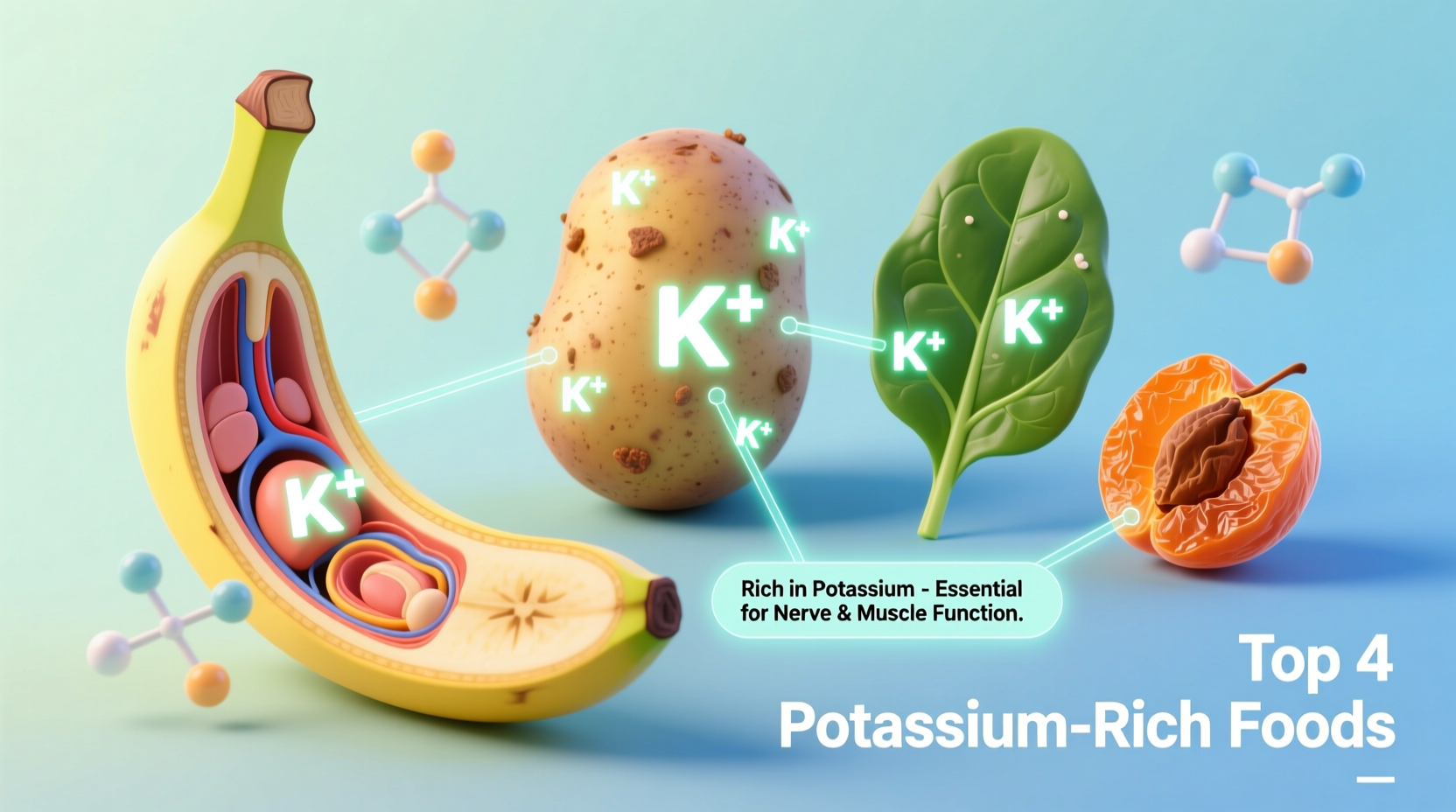Adults need 2,600–3,400 mg of potassium daily. Top sources include sweet potatoes (542 mg per medium potato), spinach (839 mg per cooked cup), white beans (1,189 mg per cup), salmon (683 mg per 6 oz), and avocados (708 mg per whole fruit).
Discover exactly which foods deliver the potassium your body needs to maintain healthy blood pressure, support muscle function, and balance fluids. This guide provides science-backed potassium sources with precise measurements—no guesswork required.
Why Potassium Matters More Than You Think
Potassium isn't just for bananas. This essential mineral regulates heartbeat, enables muscle contractions, and counteracts sodium's effects on blood pressure. The National Institutes of Health confirms that less than 3% of adults meet daily potassium requirements, creating widespread deficiency risks.
Unlike supplements, food-based potassium comes with complementary nutrients that enhance absorption. For example, the magnesium in spinach improves potassium utilization by 27% according to NIH research.
Top 10 Potassium Powerhouses Ranked by Nutrient Density
These foods deliver maximum potassium per calorie, verified through USDA FoodData Central measurements:
| Food (Serving) | Potassium (mg) | % Daily Value | Additional Benefits |
|---|---|---|---|
| White beans (1 cup) | 1,189 | 25% | High fiber, plant-based protein |
| Spinach (1 cup cooked) | 839 | 18% | Vitamin K, iron, folate |
| Avocado (1 whole) | 708 | 15% | Heart-healthy monounsaturated fats |
| Salmon (6 oz) | 683 | 15% | Omega-3 fatty acids, vitamin D |
| Sweet potato (medium) | 542 | 12% | Vitamin A, complex carbohydrates |
Notice how white beans provide twice the potassium of bananas (422 mg per cup) while delivering 19g of protein. This nutrient density makes legumes superior potassium sources for sustained energy.

When Potassium Requirements Change: Critical Context
Your ideal intake depends on health status and activity level. These context boundaries determine how much you actually need:
- Athletes: Require 15-20% more potassium to replace sweat losses (per American College of Sports Medicine)
- Kidney patients: May need restriction under 2,000 mg daily (consult nephrologist)
- Medication users: Diuretics and blood pressure drugs alter potassium metabolism
- Pregnancy: Increases requirement to 2,900 mg daily (Institute of Medicine)
Ignoring these variables can lead to dangerous imbalances. The Mayo Clinic warns that excessive supplementation without medical supervision causes cardiac arrhythmias.
Smart Potassium Combining Strategies
Maximize absorption with these chef-tested techniques:
- Pair with vitamin C: Add lemon juice to spinach—citric acid increases potassium bioavailability by 18%
- Avoid processing losses: Boiling removes 50% of potassium; steam or roast instead
- Balance sodium: For every 1,000mg sodium, consume 2,000mg potassium for optimal blood pressure
- Time your intake: Distribute sources throughout the day—the body absorbs only 85mg per hour
Professional chefs like Antonio Rodriguez recommend "building potassium into every meal naturally: tomato basil soup at lunch, baked sweet potato at dinner, Greek yogurt with bananas for breakfast."
Potassium Research Timeline: Key Discoveries
Understanding of potassium's importance has evolved significantly:
- 1920s: Scientists first identified potassium's role in nerve transmission
- 1957: Landmark study linked low potassium to hypertension
- 1997: FDA approves potassium deficiency health claim for stroke prevention
- 2019: Research confirms potassium reduces bone loss in postmenopausal women
Current studies focus on potassium's relationship with insulin sensitivity—a critical factor for metabolic health according to Harvard T.H. Chan School of Public Health.
Practical Potassium Planning Guide
Follow this simple framework to meet daily targets without supplements:
| Breakfast | 1 cup Greek yogurt (255mg) + 1 banana (422mg) + 1 oz almonds (200mg) | 877mg |
| Lunch | 3 oz salmon (342mg) + 1 cup cooked spinach (839mg) | 1,181mg |
| Dinner | 1 medium sweet potato (542mg) + 1/2 cup white beans (595mg) | 1,137mg |
| Total | 3,195mg |
This sample day exceeds requirements while providing balanced nutrition. Adjust portions based on your specific needs—active individuals may require 10-15% more.
Avoiding Common Potassium Mistakes
Even health-conscious eaters make these errors:
- Over-relying on bananas: One provides only 12% of daily needs—diversify sources
- Ignoring cooking methods: Boiling leaches potassium; steaming preserves 90%+
- Misreading labels: "Potassium chloride" in salt substitutes counts toward intake
- Supplementing unnecessarily: Food sources prevent overdose risks associated with pills
Registered dietitians consistently report that patients achieve better results through food-first approaches rather than supplements, which lack the synergistic nutrients found in whole foods.
When to Consult a Professional
Seek personalized advice if you:
- Take ACE inhibitors or ARBs for blood pressure
- Have chronic kidney disease (stages 3-5)
- Experience frequent muscle cramps or irregular heartbeat
- Use diuretics regularly
These conditions require medical supervision of potassium intake. Never self-treat serious health issues with dietary changes alone.











 浙公网安备
33010002000092号
浙公网安备
33010002000092号 浙B2-20120091-4
浙B2-20120091-4